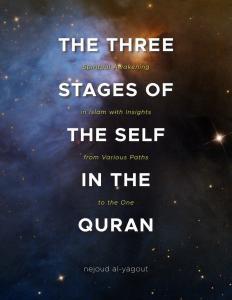
The Three Stages of the Self in the Quran with the subtitle: Spiritual Awakening in Islam with Insights from Various Paths to the One – is hot of the press. The book was released just a few hours ago by the Kuwaiti writer, poet, essayist, and founder of The Interheart Initiative Nejoud Al-Yagout. She called me a few weeks ago and asked if she could use quotations from various books on holybooks.com. She was working on this book The Three Stages of The Self in the Quran that focuses on the three types of self mentioned in the Noble Quran—the lower self, the self-blaming ego, and the reassured self. From there she discusses the possible stages of spiritual awakening. While her personal background is Islamic, the book includes insights from The Holy Bible, The Bhagavad Gita, Sri Guru Granth Sahib Ji, the Dhammapada, the Tao Te Ching with insights from Rabbi David Rosen, Dadi Janki, Shaykh Abd al Qadir al Jilani, Paramahansa Yogananda, Karen Armstrong and more!
Download the free PDF e-book here (76 pages) – Updated 13/1/2021 (The correction is regarding the first type of nafs in the Quran in the chapter The Lower Self. The information that scholars are divided as to whether the words in verse 12:53 of the Quran were uttered by Prophet Joseph’s master’s wife or Prophet Joseph has been included in this updated version).
 The Three Stages of the Self in the Quran Updated
The Three Stages of the Self in the Quran Updated
How does the concept of self appear in the Quran?
The concept of self, or the “self” in the Quran, is a complex and multi-faceted concept that is addressed in various ways throughout the text. The Quran emphasizes the importance of self-awareness, self-reflection, and self-discipline as essential components of a person’s spiritual development.
One of the most central concepts in the Quran is the idea of Tawheed, or the Oneness of God. This concept underlies much of the Quran’s teachings about the self and the relationship between the individual and the divine. According to Tawheed, there is only one true god, and everything in the universe is a reflection of that god. The self, therefore, is not considered to be a separate, independent entity, but rather a part of the larger whole that is God.
Another important concept related to the self in the Quran is the idea of accountability. The Quran teaches that every person will be held accountable for their actions on the Day of Judgment. This emphasis on accountability is intended to encourage individuals to take responsibility for their actions and to strive to lead lives that are pleasing to God.
The Quran also emphasizes the importance of self-control and self-discipline. It encourages individuals to control their impulses and desires, and to focus on developing virtues such as patience, generosity, and humility. The Quran teaches that by mastering one’s self, one can also master one’s relationship with God and the world.
In addition, the Quran talks about the human soul and its nature, it teaches that the soul is a sacred trust given by God, and that one must take care of the soul by doing good deeds, seeking knowledge, and growing closer to God.
In summary, the concept of the self in the Quran is complex and multi-faceted, it’s central concepts are the oneness of God, the accountability for the actions, self-control and self-discipline, and the importance of taking care of the soul.


Greetings
Am kindly asking if you can share with me the quran book
I always appreciate the discussion on philosophy – knowledge of worldly things, deeply seeking its meaning within celestrial regards – Infinite, but truly miniscule. I love the openness of drawing knowledge from Abrahamic religions and ancient ones. I am most instrigued by the the aspect of self-awareness, beatitudes, and in ancient context not being disillusioned. Self-awareness brings self-governance and the want of a peaceful state. It is to question whether the lesser moral compass and character equals the same self-awareness – to know mischieveous thought? Emerging self-discipline, our imperfection, and human nature – yet, love – to be humbled in our self-reflection – and again, pained in our angers.
Thank you for this share. I am looking forward to exploring the deliberations.
Wonderful how she demonstrates that all paths lead to The One
Hi Davis, thanks for your comment. I agree, she is a remarkable author and person.